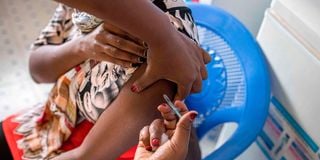Covid vaccine fears: 'My husband said I'll be infertile'

A woman is inoculated with a Covid-19 vaccine at Oltepesi Dispensary in Kajiado, Kenya, on September 9, 2021.
On the morning of March 13, 2020, Phelestus Hoka Libulele, 55, was busy making a school bag on her sewing machine from her tiny rented room in Korogocho, a low-income settlement in Nairobi. Suddenly, she heard her children in the opposite room shout “Mama! Mama! Mutahi (former Health Cabinet Secretary Mutahi Kagwe) says someone has been found with Covid-19!”
She immediately stopped sewing and rushed to watch the news. On the screen of her television was a breaking news banner saying that Kenya had recorded its first coronavirus case.
“Oh God, this is death!” she thought to herself. In subsequent days, she kept watching the news to gather as much information as she could on the symptoms. Being a community health volunteer, she knew she would soon be bombarded with questions about the disease.
Weeks later, news stations were awash with reports of multiple Covid-19-related deaths in developed countries. Libulele was scared stiff.
“It felt like death was running fast towards Kenya. I shrank every time the newscaster said that people had died from Covid-19 and scientists were yet to discover a cure,” she says.
But even as she struggled with her own fears of looming death, her children and villagers swarmed her with endless questions. “How can we prevent the disease? How do we treat Covid-19 if we are infected?”
They expected her to have all the answers, unaware that even she was struggling to make sense of what would later become a full-blown global pandemic.
But even in her state of puzzlement and fear, she had to be there for her community. She would promptly respond to distress calls from people reporting children with cold-like symptoms and even adults with diarrhoea.
“I took risks to help my people during a very challenging time,” she now says as she looks back.
Soon, things would get tougher for Libulele and millions of other Kenyans — several public health measures including the enforcement of a nine-month school closure brought her to her knees.
“There was no longer any market for my bags,” says Libulele, who runs the business with her husband. Together, they produce denim bags for primary and secondary school learners.
“In a good season, I’d make a profit of more than Sh100,000. With the closure of schools, my source of income disappeared overnight. We could no longer feed our children or pay rent.”
Covid-19 vaccines
For months, she prayed for a Covid-19 cure so that she could revive her business.
News that scientists had developed some effective vaccines and that Kenya would soon receive AstraZeneca jabs was a relief.
When she heard she was in a priority group to receive the jab as a frontline worker, she was excited.
While she couldn’t wait to receive the first dose of medicines, she noticed that her husband, unlike her, was completely disinterested.
On March 2021, Kenya received 1.02 million doses of the Oxford/AstraZeneca vaccine courtesy of the Covax programme, a worldwide initiative aimed at equitable access to Covid-19 drugs co-led by the Global Alliance for Vaccines and Immunisation, the Coalition for Epidemic Preparedness Innovations and the World Health Organisation (WHO).
When they arrived at a local private facility, Libulele was at the premises by 10 am to receive the injection. She has since been fully vaccinated and recently received a booster jab. Meanwhile, her husband, 62, had made it clear that he would never get the vaccine.
“He said he did not like the sight of his friend who had been vaccinated,” she says.
“He said he appeared frail and sickly and he did not want to go through the same.”
With time, there would be many more like Libulele’s husband.
The arrival of the first batch of the vaccines marked the start of a national campaign to rally Kenyans to get the jab. The Ministry of Health began a mass vaccination exercise — posters were plastered everywhere — on public transport vehicles, public toilets, hospitals and estate gates.
Additionally, pro-vaccine advertisements ran on television and radio stations as well as on online media. Some were done through the workers going around in vehicles with an announcement speaker, listing hospitals to get the vaccine and the benefits thereof.
Others sensitised people at sporting events, churches and social halls.
Vaccine hesitancy
Prior to the arrival of the vaccines, the Ministry of Health had drafted a National Covid-19 Vaccine Deployment Plan providing guidance on how the government would realise its target of vaccinating 27 million adult Kenyans by the end of 2022.

A woman receiving a Covid-19 vaccine at Kencom bus stop in Nairobi on December 29, 2021. In March 2021, Kenya received 1.02 million doses of the Oxford/AstraZeneca vaccine courtesy of the Covax programme.
It laid out three vaccination phases. Phase one (March-June, 2021) targeted health workers, security personnel, teachers and persons above 58 years. They would receive the shots at 800 private and public Level IV, V and VI facilities.
Phase two (July-December 2021) targeted frontline workers not reached in phase one and those aged above 50 years. It also targeted those above 18 but with comorbidities, the disabled, staff in hospitality and transport sectors as well as care homes and prisons.
Phase three (January to December 2022) was the open access vaccination whereby anyone could get the vaccines available at any of the thousands of hospitals across Kenya.
Initial uptake of Covid-19 appeared positive as evidenced by long queues at public facilities offering jabs and stock-outs. But by the time Kenya got to phase three, there was a noticeable pocket of people with vaccine hesitancy.
The mass vaccination drive was marred by the spread of misinformation on social media, with some of the concerns being fears of infertility in women and lowered libido in men, among others.
And while the Health ministry debunked some of these myths through media briefings and social media campaigns, the flow of the misinformation was overwhelming and affected the uptake of Covid-19 vaccines.
Take James Njenga, who admits that he fell for the misleading information. The resident of Komarock estate in Embakasi Central says he read torrents of messages in his estate WhatsApp group that made him shy away from the Covid vaccines.
“Some said they had lost interest in sex after receiving the dose. Others said their friends had died or were severely affected by it. I couldn’t tell whether it was true or not but it was scary,” says the married 30-year-old.
His wife got vaccinated in 2021. He remembers how the side effects she experienced such as muscle aches and fever made him even more paranoid. He only changed his mind last June after attending a community outreach in Komarock.
A female health worker shared bits of information about vaccines and Covid-19 through a public announcement speaker. What stuck with him was what she said about side effects.
“She said that depending on the person, the side effects could be mild or severe,” he says.
“I said let me take the risk with the Johnson&Johnson vaccine,” he adds.
‘He said I’ll be infertile’
Another city resident, Eve Moraa, says her husband made his stand about the Covid-19 vaccine clear.
“He warned me against getting the jab. He said I’ll only be vaccinated after we finish having children. He was afraid I’ll be infertile,” she said.
“I don’t want to defy him by secretly getting the vaccine and end up infertile,” adds the 35-year-old who resides in Kilimani estate. They have two sons and want two more children.
Moraa also says her husband is yet to get the jab because he fears losing his sex drive.
Libulele, Njenga and Moraa highlight the importance of vibrant messaging in countering false information.
Epidemiologist and head of Infectious Diseases and Environmental Health at the African Population and Health Research Center, Dr Abdhalah Ziraba, blame the Health Ministry for not doing enough to counter online misinformation.
“Mainstream public health messaging wasn’t designed to counter misinformation,” he says.
“Public health messaging should move away from the old style of gluing posters in public places to online spaces where this misinformation is being spread,” he recommends.
As of December 16, 2022, Kenya’s Health ministry reported that 23 million vaccine doses had been administered to 18 million adults, against a target of 27 million Kenyans.
Rural versus urban uptake
In some African countries, geographical barriers, belief in herbal medicine and cultural traditions determined who should go for the vaccine.
“Generally, across Africa, there was lower uptake of vaccines in rural areas compared to urban ones. One of the reasons for this is that much of the sensitisation was done in urban areas,” says Dr Ziraba.
“Look at countries like Uganda or Burundi which are predominantly rural,” he offers.
Nigeria is the most populous country in Africa with about 216 million people. And while it aimed to vaccinate at least 112 million adults, vaccine hesitancy worried Centers for Disease Control and Prevention staff in the country, prompting them to conduct a study on the same between July 26 and August 12, 2021, with nearly 3,500 participants from eight Nigerian states.
Fifty-six per cent of the surveyed were found to be unvaccinated with a lack of confidence in vaccines ranked as the top reason for not getting it. Respondents also cited fear of possible side effects, mistrust of the government and not believing that Covid-19 existed.
“I may not have the figures, but I know in northern Nigeria (a largely Muslim region), more men than women went for the vaccines. The religion restricts men from exposing women to immunisation,” says Odinaka Anudu, an editor and investigative journalist based in Abuja.
“But in southern Nigeria, which is more cosmopolitan with higher education levels, the women have more freedom of choice and that would influence higher uptake of vaccines.”
Medicines or herbs?
Meanwhile in Tanzania, where the previous administration denied Covid-19’s existence and the government neither published data nor vaccinated its people until recently, Judith Laizer, a Dar es Salaam resident, says they were conflicted over whether to take vaccines or medicinal herbs.
“For many people, Covid-19 symptoms like headaches have been treated with herbs. So there was the question of should we keep taking our herbs or go for vaccines?” she says.
In her own analysis based on anecdotal evidence, she reckons that Tanzanian women are more willing to go for the jab than men who will probably say “I’ll maintain a healthy lifestyle” or “I exercise a lot so I’m safe”. She is vaccinated while her husband is not.
The country only received its first batch of one million vaccines on July 24, 2021, upon joining Covax a month earlier. This came after the death of President John Magufuli who was an unabashed Covid denier. Now, the government aims to fully vaccinate 34 million people on the mainland and 900,000 people in Zanzibar by the end of this year.
As of November 26, 2022, a total of 32,893,229 vaccine doses have been administered, according to WHO.
The fact that African countries have not met their vaccination targets is concerning and until the issue of vaccine hesitancy is addressed, women and men like Moraa and her husband will continue to be at risk and endanger the lives of others.





